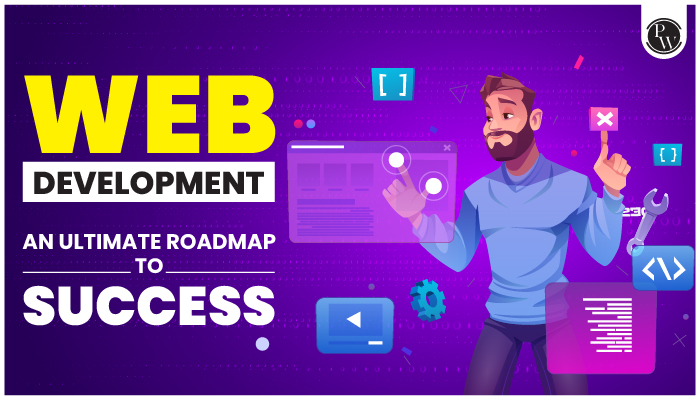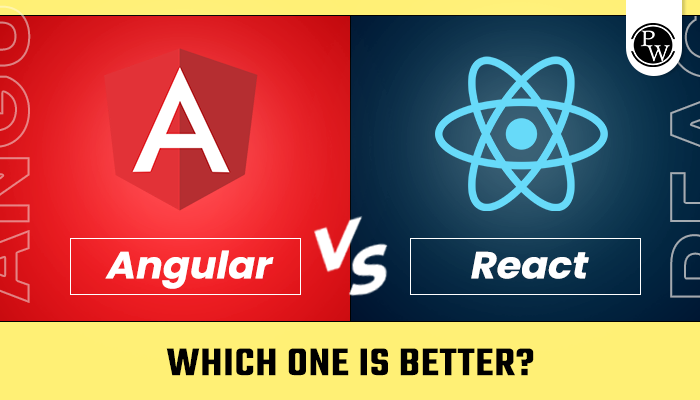Full-Stack Web Developer: In the ever-evolving realm of technology, the need for skilled professionals has reached unprecedented heights. One of the most sought-after roles in the tech industry is that of a Full Stack Web Developer. If you’re contemplating a career in web development or thinking about a career change, becoming a Full Stack Web Developer might be the right choice. Additionally, enrol in a Full-Stack Web Development Course to take your web-development career to the next level!
In this article, we will discuss what full-stack development is, the responsibilities of a Full Stack Web Developer, and five reasons why you should consider pursuing this career path.
What Is Full-Stack Developer?
A Full-Stack Web Developer is a versatile professional capable of creating both client and server software, bridging the gap between front-end and back-end development. They possess a wide range of skills, making them essential for building comprehensive and seamless websites.

Front-end Development
Front-end tasks pertain to the visible and interactive elements of a website that users encounter directly, encompassing aspects such as design, user interface, and user experience. This involves the utilisation of HTML, CSS, and JavaScript to craft the visual components and user engagement. Front-end developers are responsible for enhancing the appearance and seamless functionality of websites.
Back-end Development
The back end of a web application is the server side, which includes the database, server, and application logic that enables the website to function. Back-end developers work with server-side languages and databases, such as Python, Ruby, Node.js, and SQL.
While front-end development focuses on what users see and interact with, back-end development focuses on the behind-the-scenes operations. Back-end developers ensure efficient data storage, processing, and delivery. They manage the server’s architecture, databases, and the application’s logic to establish a solid foundation for web applications.
A Full Stack Web Developer bridges the gap between these two domains, possessing proficiency in both front-end and back-end technologies. This versatility empowers Full Stack Web Developers to create comprehensive and functional web applications, making them indispensable in the tech industry.
Top 5 Reasons to Consider a Full Stack Development Career
Now that you have a comprehensive understanding of Full Stack Development and the roles and responsibilities of Full Stack Web Developers, let’s delve into the five reasons to contemplate this career path:
Also Check : How to become full stack web developer
1. High Demand and Job Prospects
The tech industry is in a perpetual state of evolution, with businesses actively seeking professionals who can adapt and contribute to their success. Full Stack Web Developers are in great demand because they can assume multiple roles, reducing the necessity for specialised developers for each facet of a project. This translates into improved job prospects and career stability.
Today, businesses are rapidly growing online. They use websites, apps, and web programs. This has created a need for web developers.
Full Stack Web Developers are highly sought after because they can handle both the front-end and back-end of a project. They manage everything from creating the user interface to setting up the server and database. This makes them versatile and valuable to development teams.
The robust demand for Full Stack Web Developers results in excellent job prospects. Companies are actively seeking professionals who can efficiently handle various web development responsibilities. Whether you aspire to work for a tech giant, a startup, or embark on a freelance career, Full Stack Development offers a wide array of employment opportunities.
2. Versatility and Problem-Solving Abilities
Full Stack Web Developers are inherently problem solvers. Their capacity to operate on both the front-end and back-end equips them to tackle challenges from multiple angles. This versatility is a substantial asset, enabling them to handle diverse projects and address a wide spectrum of issues.
Versatility is a hallmark of Full Stack Development. Full Stack Web Developers possess an extensive skill set, empowering them to adapt to different roles within a project. This versatility transforms them into invaluable team members who can step in wherever their expertise is required.
In the contemporary digital age, enterprises are rapidly enhancing their online visibility. Web applications, including e-commerce websites and mobile apps, now play a crucial role in various sectors. This increasing need for online solutions has resulted in a significant deficit of proficient web developers.
Employers find Full Stack Web Developers particularly attractive because they possess the capability to handle both the front-end and back-end aspects of a project. Consequently, they can supervise the complete development cycle, encompassing tasks like designing the user interface and setting up the server and database.
3. Enhanced Career Growth and Salary Potential
Full Stack Web Developers often ascend to leadership positions due to their extensive knowledge and skills. They can lead development teams, manage projects, and shoulder responsibilities that culminate in career growth. Moreover, their versatility commands a higher salary in comparison to developers with expertise confined to one domain.
Web development is a fast-paced field teeming with opportunities for career advancement. Full Stack Web Developers are strategically positioned to capitalise on these opportunities owing to their extensive skill set. Here’s how they can progress in their careers:
- Team Leadership: Full Stack Web Developers often transition into leadership roles, such as Lead Developer or Technical Lead. They can guide and mentor junior developers and make pivotal decisions about project architecture and technology choices.
- Project Management: With experience, Full Stack Web Developers may evolve into project management roles. They can supervise entire projects, ensuring their timely and budgetary completion. This transition can lead to roles like Project Manager or Scrum Master.
- Specialisation: While Full Stack Web Developers are proficient in both front-end and back-end technologies, they can elect to specialise in one area if they have a particular inclination. For instance, they can become experts in front-end technologies and pursue roles as Front-End Developers or UI/UX Designers. Alternatively, they can concentrate on back-end technologies and become Back-End Developers or Database Administrators.
The diversified skill set of Full Stack Web Developers positions them as problem solvers and decision-makers, attributes highly esteemed in the tech industry. Consequently, their salaries tend to be more lucrative compared to developers with specialized skills. Furthermore, the demand for Full Stack developers often surpasses the supply, further bolstering their earning potential.
PW Skills Recommended Courses
- Decode DSA with C++
- Full Stack Data Science Pro Course
- Java For Cloud Course
- Full Stack Web Development Course
- Data Analytics Course
4. Opportunities to Work on Diverse Projects
As a Full Stack Web Developer, you will have the opportunity to work on a multitude of projects, ranging from e-commerce websites to social media platforms and web applications. This diversity keeps the job engaging and offers new learning experiences with each project.
Web development projects span various industries and applications.
Full Stack Web Developers have the privilege of working on diverse projects that cater to distinct audiences and serve a myriad of purposes. This variety keeps the job stimulating and consistently challenges developers to adapt to new requisites and technologies.
Here are some instances of the types of projects Full Stack Web Developers can engage with:
- E-Commerce Platforms: Building and maintaining e-commerce websites is a prevalent task for Full Stack Web Developers. These platforms necessitate extensive front-end and back-end work, including secure payment processing, product listings, and user accounts.
- Social Media Networks: Social media platforms require complex features and functionalities. Full Stack Web Developers can contribute to the development of features such as user profiles, messaging systems, news feeds, and data analytics.
- Web Applications: Numerous businesses depend on web applications to manage their operations. Full Stack Web Developers may work on applications for project management, customer relationship management (CRM), inventory management, and more.
- Start-ups: Joining a start-up as a Full Stack Web Developer can be an exhilarating and entrepreneurial experience. Start-ups frequently require developers to don multiple hats, rendering the job dynamic and challenging.
Working on diverse projects not only keeps Full Stack Web Developers engaged but also enriches their skill set. They get to explore different technologies, industries, and user experiences, which broadens their knowledge and expertise.
5. Increased Autonomy and Entrepreneurial Opportunities
Full Stack Web Developers often have the autonomy to work independently on smaller projects. This autonomy can pave the way for entrepreneurial opportunities, as they can create their web applications or embark on freelance careers. The capability to conceive and manage complete projects from inception to conclusion opens the door to entrepreneurship.
Full Stack Web Developers relish the flexibility to work on a wide array of projects, including personal ventures. This liberty permits them to unleash their creativity and construct their web applications, which can lead to entrepreneurial prospects. Here’s how Full Stack Development can serve as a springboard for entrepreneurship:
- Freelancing: Full Stack Web Developers can proffer their services as freelancers, working on various projects for clients. Freelancing offers flexibility, independence, and the liberty to select projects that resonate with their passion.
- Start-up Founders: Numerous prosperous tech start-ups have been established by Full Stack Web Developers. Their ability to manage both the front-end and back-end of a project positions them favourably for entrepreneurial endeavours. They can breathe life into their ideas independently or collaborate with kindred spirits.
- Open-Source Projects: Full Stack Web Developers can contribute to open-source projects, which not only benefits the community but also showcases their skills. Contributions to open source can lead to collaborations and potentially entrepreneurial opportunities.
Full Stack Web Developers who opt for the entrepreneurial route can design their web applications, mobile apps, or other digital products. They can monetise their creations, seek investments, or even build businesses centred around their projects.
This level of autonomy is enticing to those who desire more control over their work and projects. It signifies the myriad opportunities available to Full Stack Web Developers.
Roles and Responsibilities of Full Stack Web Developers
Full Stack Web Developers play a pivotal role in web development projects, encompassing a wide range of responsibilities, including:
Designing User Interfaces
Full Stack Web Developers make user-friendly and visually appealing interfaces. They use HTML, CSS, and JavaScript to design web pages for a smooth user experience.
Front-end developers create website layout, colour schemes, and aesthetics. They aim for an engaging experience that attracts and keeps users. This is vital for gaining and retaining users.
Building Front-end Components
They create interactive front-end components and features using JavaScript libraries and frameworks like React, Angular, or Vue.js. This entails implementing client-side functionality to enhance user interactions.
Front-end developers employ JavaScript and its frameworks to create dynamic and interactive elements on a website. Whether it’s a responsive navigation menu, a real-time chat feature, or a form validation system, front-end developers breathe life into websites by enhancing user interactions.
Setting Up Servers
Full Stack Web Developers configure and maintain servers to ensure the proper functioning of web applications. They work with server-side technologies and databases, making data accessible to the front-end.
The server management aspect of web development focuses on the back-end. Back-end developers have the responsibility of setting up and maintaining servers while ensuring their security, performance, and scalability. They choose server-side technologies and databases that match the project’s requirements.
Managing Databases
They design and manage databases to efficiently store and retrieve data. Proficiency in database management systems like MySQL, MongoDB, or PostgreSQL is vital.
Databases play a pivotal role in numerous web applications, and backed developers are tasked with their administration. They shape the database’s framework, ensure data integrity, and enhance query performance for speedy data retrieval. A properly organised database is essential for the optimal functioning of a web application.
Debugging and Testing
Full Stack Web Developers are responsible for identifying and rectifying issues on both the front-end and back-end through debugging and testing, ensuring a seamless user experience.
The process of developing a web application is rarely devoid of errors. Full Stack Web Developers need to excel in debugging and testing tools and practices. They must discern and resolve issues to guarantee the smooth functioning of the application, free from bugs or glitches.
Integration
Full Stack Web Developers combine front-end and back-end parts to make web apps run smoothly. This involves handling data transfer, server-client communication, and keeping the app working correctly.
Integration is the key. It’s where Full Stack Web Developers make sure the front-end and back-end work together. They manage data transfer, handle requests, and ensure the server processes user interactions accurately. When a web app is well-integrated, it provides users with a smooth and consistent experience.
Version Control
Full Stack Web Developers utilise version control systems like Git to monitor code changes and collaborate effectively with other developers on projects.
In the world of collaborative coding, version control holds paramount importance. Full Stack Web Developers employ tools like Git to oversee code versions, collaborate with team members, and safeguard the codebase’s integrity. Version control ensures that multiple developers can work on a project concurrently without conflicts.
In essence, Full Stack Web Developers are versatile individuals who can handle diverse aspects of web development. Their adaptability and capacity to work on both the client and server sides render them indispensable in today’s tech landscape.
How to Future-Proof Your Career as a Full-Stack Developer?
Here are the steps to prepare for the future through Full-Stack Development:
- Learn the Fundamentals of Front-end and Back-end Technologies
Initiate your journey by establishing a solid foundation in front-end and back-end technologies. Commence with HTML, CSS, and JavaScript for the front-end, and delve into server-side technologies like Node.js, Ruby on Rails, or Django for the back-end.
- Choose a Specialisation (If Desired)
While Full Stack Web Developers are adept in both front-end and back-end technologies, you can opt for specialisation in one area if you have a particular preference. This specialisation can enhance your value in specific roles, such as a Front-End Developer or Back-End Developer.
- Construct a Robust Portfolio
Cultivate a portfolio of projects that showcase your skills. This can encompass personal projects, contributions to open-source initiatives, or freelance work. A compelling portfolio will distinguish you from prospective employers and clients.
- Remain Current with Industry Trends and Emerging Technologies
The tech industry is in a perpetual state of flux. To maintain your competitive edge, perpetually learn and explore new technologies and trends. Stay attuned to tech blogs, participate in web development conferences, and engage in online courses or bootcamps to expand your knowledge.
- Network and Collaborate
Fostering a professional network is indispensable in the tech sector. Attend meetups, become part of online communities, and collaborate on open-source projects. Networking can lead to job opportunities and valuable connections in the industry.
Conclusion
Full Stack Development is a dynamic and rewarding career path with numerous benefits. From high demand and job prospects to the versatility and problem-solving abilities that come with being a Full Stack Web Developer, there are ample reasons to consider this field. To get future-ready, follow the steps mentioned above, and stay committed to continuous learning.
Full Stack Development offers a world of opportunities, and with the right skills and dedication, you can thrive in this ever-evolving industry.
Don’t wait any longer, enroll in the PW Skills Full Stack Web Development Course today!
Learn the skills you need to become a job-ready web developer in no time. Our course is comprehensive, affordable, and taught by experienced instructors. Enroll now and start your journey to a successful career in web development!
| Recommended Reads | |
| Java Vs C++ Vs Python | Java or C++ which is better |
| What is STL in C++ | Top Features of C++ programming language |
Full Stack Web developer FAQs
Which technologies should I focus on as a Full Stack Developer?
Consider technologies like React, Node.js, Express.js, and MongoDB for a strong start, or explore other stacks based on your project needs.
Are Full Stack Developers in demand in specific industries?
Full Stack Developers are sought after across various sectors, with fintech, e-commerce, and healthcare offering significant opportunities due to the growth of web-based applications.
How do Full Stack Developers keep up with evolving technologies?
Continuous learning through online courses, tech conferences, blogs, and coding communities helps Full Stack Developers stay current with emerging trends.
Can you share success stories of Full Stack Developers turned entrepreneurs?
David Karp, the creator of Tumblr, is a notable Full Stack Developer who founded a successful start-up.
Can Full Stack Developers work remotely or as freelancers?
Yes, Full Stack Developers often enjoy the flexibility of working remotely or as freelancers. Platforms like Upwork, Freelancer, Toptal, and Fiverr offer freelance opportunities in Full Stack Development.



